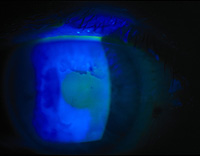DISEASES OF THE OUTER EYE
Inflammations and small traumas of the cornea are common. Usually they heal quickly but are often painfull. There is one exceptional infection that is nearly painless, beginning herpes simplex-infection. It is an infection of the nerves and therefore the pain sensation is diminished. Because the eye does not hurt, a patient with herpes simplex keratitis (keratitis = inflammation of the cornea) may not realize that he should be treated. Quite often the infection has prevailed weeks or months before it is diagnosed.
Corneal erosions, small wounds, may be caused in many ways: a comb, a scarf, or a piece of dirt may scratch the surface. Superficial corneal wounds heal in a few hours if the eye is treated with ointment and kept closed for a couple of hours. It is best to keep both eyes closed so they do not move.
A. |
||
Small scratches and wounds are easier to see if the surface is stained with fluorescein. A. Dry fluorescein ”sticks” can be used to apply small amount of the dye on the conjuntiva of the lower lid from where it spreads into the tear fluid and stains the wound. B. A healing wound has cloused, the surface is even but under the thin epithelial layer is a drop of fluid that delays the growing of the cells into the deeper layers of the cornea. At this stage the wound is easily torn open, especially in the morning if the lid has adhered to the wound area where the tear layer is not normal. |
||
If the wound is not allowed to heal well, it easily breaks open a new. If this happens several times the wound may not heal completely but becomes a recurrent wound breaking open now and then. The eye is then painful, watering and light sensitive. The healed wound is often torn open in the morning when the eye lids are opened. During the night less tears are formed than during the day. The lid may adhere to the healing surface of the wound and pull it loose when opening. It is therefore important to use lubricating ointment each night at least a week after the trauma. If a recurrent erosion is present it is often necessary to use the ointment for at least six months.
Inflammation of the conjunctiva, conjunctivitis, is common when a person has flu or common cold. The discharge and watering usually disappear without medication, sometimes antibiotic drops are needed.
Allergic reactions make eyes itching, irritated and watering. The best treatment of allergic reactions would be to avoid the allergen but often it is not known. There are many different medications, pills, eye drops, and nasal sprays to reduce the symptoms. Eye drops that contain cortison-like medications, steroids, should be used sparingly. If they are needed for a longer time, an ophthalmologist should take care of the patient. Since the reaction is superficial, medications that do not get deeper into the eye should be used. Among steroids, hydrocortison does not enter through the cornea.
Conjunctiva may swell sometimes. The loose conjunctival tissue may swell so much that part of it hangs outside the lids. It looks bad but is not dangerous. Conjunctival oedema is caused by allergic and toxic reactions: insect bites, plant juices (often geranium), dusts, or food allergens. Swelling disappears in a few hours to few days. It disappears more quickly if the eyes are covered with cold, dry compress (crushed ice in plastic bag wrapped in a towel). Decongestive eye drops help, too.

